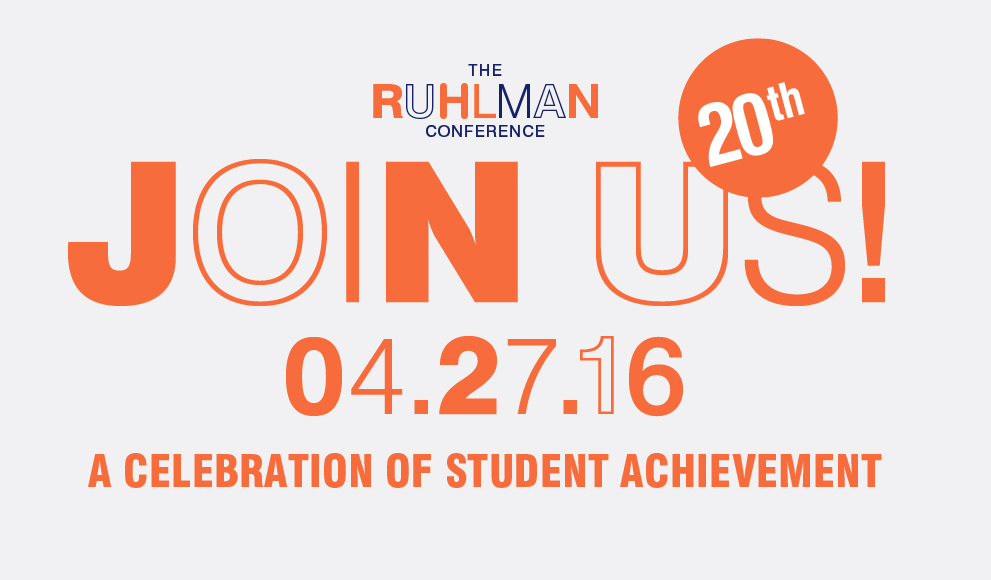The Ruhlman Conference, a Celebration of Student Achievement, Celebrates its 20th Year

It's Ruhlman day!
Representing the work of nearly 300 Wellesley students, and organized around three major themes: Humanities, Science and Technology, and Social Sciences, the Ruhlman Conference brings students together each spring to present work to an unusually wide audience. The conference, which is made possible by the Barbara Peterson Ruhlman Fund for Interdisciplinary Study, is intended to foster collaboration among students and faculty across the disciplines and to enhance the intellectual life of the College. The program is celebrating it's 20th anniversary this year.
"As we celebrate the 20th annual conference, it is hard to imagine Wellesley without the Ruhlman Conference," wrote Lee Cuba, Professor of Sociology and former Dean of the College, and Adele Wolfson, the Nan Walsh Schow '54 and Howard B. Schow Professor in the Physical and Natural Science and interim dean of students, in a history of the conference published in the opening pages of this year's program guide book. "It is built into our calendar and our consciousness. Students look forward to their presentations as they plan their research projects. Faculty mark the years by remembering which students participated in a Ruhlman panel or poster session..."
Cuba worked with Barbara Peterson Ruhlman '54 to develop the plan for the Ruhlman Conference and chaired the program committee from 1997-1999. Wolfson was Associate Dean of the College from 2004-2010 and also chaired the program committee. They wrote:
"Part of the joy of the day is the way in which traditional divisions are broken down. Science talks happen in Pendleton, poetry readings in the Science Center. Panels are created that cross disciplines and make new connections; their audiences are filled with staff, faculty, and students interacting with the presenters and with one another in new ways.
And part of the joy comes from Barbara Ruhlman's obvious delight in her creation. The gratitude that flows back and forth between her and the students adds to the special nature of the day and is a manifestation of the connections among generations of Wellesley alumnae. It is not difficult to see why the Ruhlman Conference has become such a valued Wellesley tradition."
Special for this year's 20th anniversary celebration, visitors can check out Ruhlman Explore, an innovative computer application designed for discovering the history and ideas of the Ruhlman Conference. The application, which was built using cutting-edge multi-touch technology and is installed on a large-scale tabletop display, enables a large number of people to interact with the application collaboratively and explore the Ruhlman Conference vision and the ideas discussed at previous conferences from a new perspective. Designed by Lauren Westendorf '15 and Asiya Yakhina '16 with advisor Orit Shaer, Associate Professor of Computer Science, the application will be set up in the Diana Chapman Walsh Alumnae Hall Ballroom.
In keeping with the diversity of student interests and accomplishments, the Ruhlman Conference is open to a variety of presentation formats: papers, panels, posters, exhibitions, musical and theatrical performances, and readings of original work. The whole community is invited to come listen, see, and interact. Those not on campus can connect to the schedule of events online or via mobile app, or tune into a selection of talks via live stream.
Among the talks available on the live stream are presentations by finalists for the Maurer Public Speaking Program's second annual Jacqueline Loewe Fowler '47 Prize in Public Speaking competition. The prize honors Mrs. Fowler's support of public speaking at Wellesley through her substantial contributions to the public speaking program established by Anne E. Maurer '51 and her husband Gilbert in 2012.
This year's Fowler Prize finalists are: Zainab Younus '17 ("Nehruvian India: The Use of Economic Planning to Rapidly Industrialize an Agricultural Economy"); Savitri Restrepo Alvares '16 ("Redefining the Role of Female Ex-guerillas in Colombia’s Demobilization and Reintegration Process"); Isabel M. Starr '16 ("Bones Don’t Lie: Use of Archival and Forensic Perspectives to Understand the Origins of the Wellesley College Human Skeletal Anatomy Teaching Collection"); and Sophia N. Zupanc '19 ("Modernizing High School Mathematics: How 3D Printing and Modelling Technology Can Enhance Student Learning").
